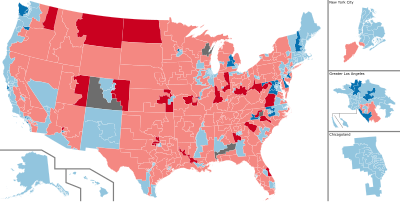
Back Wahlen zum Repräsentantenhaus der Vereinigten Staaten 2024 German Elecciones a la Cámara de Representantes de los Estados Unidos de 2024 Spanish Élections américaines de la Chambre des représentants de 2024 French Выборы в Палату представителей США (2024) Russian 2024年美国众议院选举 Chinese
| |||||||||||||||||||||||||
All 435 seats in the United States House of Representatives[a] 218 seats needed for a majority | |||||||||||||||||||||||||
|---|---|---|---|---|---|---|---|---|---|---|---|---|---|---|---|---|---|---|---|---|---|---|---|---|---|
| |||||||||||||||||||||||||
 Democratic incumbent Democratic incumbent retiring Republican incumbent Republican incumbent retiring No incumbent | |||||||||||||||||||||||||
| |||||||||||||||||||||||||
The 2024 United States House of Representatives elections will be held on November 5, 2024, as part of the 2024 United States elections, to elect representatives from all 435 congressional districts across each of the 50 U.S. states, as well as 6 non-voting delegates from the District of Columbia and the inhabited U.S. territories. Special elections may also be held on various dates throughout 2024. Numerous other federal, state, and local elections, including the U.S. presidential election and elections to the Senate, will also be held on this date. The winners of this election will serve in the 119th United States Congress, with seats apportioned among the states based on the 2020 United States census.
The House Republican Conference has been led by Mike Johnson since October 2023, following the removal of Kevin McCarthy as Speaker of the House and the speaker election which elected him. He is the first congressman from Louisiana to be elected Speaker of the House.[1]
With the election of Hakeem Jeffries as leader of the House Democratic Caucus, this is set to be the first House election since 2002 in which the Democratic Party will not be led by Nancy Pelosi. Jeffries is the first African American in the history of Congress to serve as leader of either party, and the first congressman from New York to do so since Bertrand Snell's retirement in 1938.[2]
The election is expected to be highly competitive, with forecasts suggesting less than a 5-seat difference between the 2 parties.[3] The competitive nature of the election partially stems from the 118th United States Congress being considered among the least productive since the 72nd Congress of 1931 to 1933, which has contributed to a 13% approval rating.[4] The 118th Congress is also considered to be a dramatic one, with events such as the January 2023 speakership election, the 2023 debt-ceiling crisis, the removal of Kevin McCarthy from House Speaker, the October 2023 speakership election and the expulsion of George Santos. If the Republican Party fails to keep control of the House, this would be the first time since the 1954 House elections that a party loses House control after a single congressional term.
Cite error: There are <ref group=lower-alpha> tags or {{efn}} templates on this page, but the references will not show without a {{reflist|group=lower-alpha}} template or {{notelist}} template (see the help page).
- ^ Hilburn, Greg (October 25, 2023). "Mike Johnson makes history as Louisiana's first speaker of the House of Representatives". Shreveport Times. Retrieved November 2, 2023.
- ^ McCaskill, Nolan D. (November 30, 2022). "House Democrats elect Hakeem Jeffries as Congress' first Black party leader". Los Angeles Times. Washington. Archived from the original on November 30, 2022. Retrieved December 1, 2022.
- ^ "2024 House Election: Consensus Forecast". 270 To Win. Archived from the original on February 6, 2024. Retrieved February 5, 2024.
- ^ Nicholson, Jonathan (November 15, 2023). "The Least Productive Congress Since The Great Depression". Huff Post. Archived from the original on December 17, 2023. Retrieved December 18, 2023.
© MMXXIII Rich X Search. We shall prevail. All rights reserved. Rich X Search

